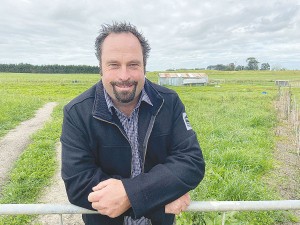Editorial: RMA reforms uproar
OPINION: The euphoria over the Government’s two new bills to replace the broken Resource Management Act is over.
 Richard McIntyre, Federated Farmers, says the visa reforms will ensure farmers have access to the staff they need to run their businesses.
Richard McIntyre, Federated Farmers, says the visa reforms will ensure farmers have access to the staff they need to run their businesses.
Changes to migrant visa settings announced last month should take a lot of pressure off farmers in the new season, says Federated Farmers immigration spokesman Richard McIntyre.
With the new rules coming into effect from March this year, they will have an immediate impact for the new dairy season starting in June.
It should take a lot of pressure off farmers, particularly during those busy times like calving and mating, he says.
"These changes are a huge win for dairy farmers and will make a real difference for those farming families and businesses who have been struggling to find the staff they need," he told Rural News.
"For the last few years, I've heard from more farmers than I'd care to count who have been under huge pressure and working some very long hours - sometimes months on end without a day off.
"This has a huge impact on those farmers' physical and mental health and creates unnecessary animal welfare risks. It also has a lot of flow-on effects too with huge pressure coming on farming families and home life."
Changes announced by Immigration Minister Erica Stanford just before Christmas include removing the requirement to pay new migrant staff at least the median wage of $31.61/hour, and extending the duration of visas for ANZSCO level 4 or 5 roles to three years, up from two years plus a one-year extension previously.
The Government has also reduced work experience requirements for skilled migrant staff from three years down to two years, increasing the pool of farm workers who qualify. A 21-day mandatory waiting period has also been removed to improve the speed of processing times.
McIntyre says that while the changes won't resolve all the staffing issues faced on dairy farms, they would go a long way to help farmers.
DairyNZ data shows that 16% of farms didn't have enough staff to meet their needs.
McIntyre points out that during the Covid-19 years when borders were closed, the dairy workforce shortage peaked somewhere between 4000 and 6000 workers.
"We've likely come back slightly from those levels, and numbers will fluctuate from year to year, but can't hide from the fact we still have persistent gaps in our farming workforce that need to be addressed.
"While these changes will by no means be a silver bullet for all our workforce needs, they will certainly go a long way in cutting out some of the needless cost and delays farmers have been facing."
Election Issue
Building the farm workforce was one of Federated Farmers' 12 policy priorities before the 2023 general election, and Richard McIntyre says they've been working hard to get these changes over the line.
"In particular, I'm pleased to see the length of visas for ANZSCO level 4 or 5 roles extended to three years, which is something we specifically requested.
"What this means is a staff member can stay in the country for three years on one single visa, instead of needing two visas by the time you apply for the one-year extension.
"This will cut thousands of dollars in costs for farmers, but it will also mean a lot less stress and uncertainty for both the farmer and the employee who just want to get on with their farming."
Farmers will no longer be stuck in a 21-day waiting period when filling critical roles, making it far easier and faster to bring in the right people for the job.
Removing the requirement to pay these staff at least the median wage is also a positive change.
"It never made sense to have to pay what are essentially entry-level farming staff the median wage, particularly when that's more than what a Kiwi in the same role would be earning," he says.
"Overall, the reforms are a significant step forward and will help ensure farmers have access to the staff we need to run our businesses.
"We're really pleased that the Minister has heard our concerns and worked with us to find these practical solutions that will make a real difference for farmers. That's the value of your Federated Farmers membership at work."
The Government's chief science advisor, Dr John Roche says the key objective for the science sector in the coming year is bedding down the reforms which sees the merger of the previous entities.
Hawke's Bay apple grower Taylor Corporation says a standout 2026 season, coming after a few difficult years, is boosting optimism among growers.
Horticulture New Zealand (HortNZ) has added its perspective to numerous primary sector voices urging the Government to strengthen its draft legislation to replace the Resource Management Act (RMA).
The Commerce Commission has finalised new information disclosure requirements for local councils and water organisations that deliver water supply and wastewater services.
Beef + Lamb NZ (B+LNZ) is calling for significant changes to the Government’s reforms to the Resource Management Act (RMA).
NZPork says the Government needs to strengthen its proposed planning laws to ensure New Zealand's pig farmers can continue to produce pork.

OPINION: The proverbial has really hit the fan in Wellington and exposed a glaring example of a double standard in…
OPINION: Dark suited spin doctors exist to, well, spin, and the nice cuddly progressive types at Greenpeace Aotearoa practice this…